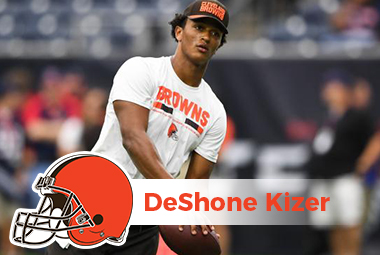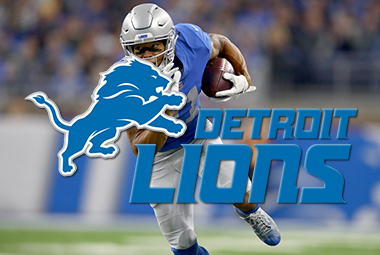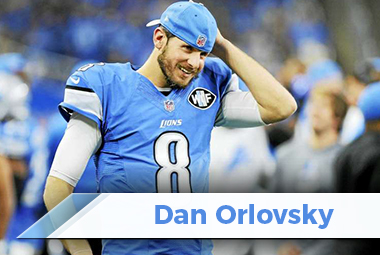Were They Both Bad and Unlucky?

The woeful Cleveland Browns made history this past NFL season (2017) by becoming only the second team to go 0-16 throughout the course of a season. There can be no question that this makes the Browns a historically bad football franchise, but does it take something more than being awful to achieve such notoriety? Could it be that Variance also did not play to their favor?
The Browns started off the season in an almost promising way. They swept the preseason (4-0) and would go on to compete meaningfully against the mighty Pittsburgh Steelers, losing the first game of the regular season by a margin of only three points. (21-18)
The Browns would be undone that game by another Brown, namely, Steelers wideout Antonio Brown, who would make a 38-yard grab to seal the game with 2:26 left on the play clock. Prior to that drive, the Browns had scored a touchdown with 3:40 left on the clock and were down by only three points. In the event they could have held the Steelers offense for just a few plays, (and they’d been doing that pretty well to that point) they could have regained possession with over two minutes remaining on the game clock.
Even with the defeat, new Browns starting quarterback DeShone Kizer would show some promise, here is his stat line from the game:
Passing: 20/30, 222 Yards, 1 TD, 1 INT, RATE: 85.69 (About Average)
Kizer would also add five rushes for seventeen yards and a touchdown on the ground.
Of course, nothing promising can last forever, or even very long, if you’re a Cleveland Brown. Kizer’s end of the season stats would bear this out:
Passing: 255/476, 2,894 Yards, 11 TDs, 22 INTs, RATE: 60.5 (Abysmal)
As you can see, after a promising preseason and first game of the regular season, things would go downhill very quickly for the Browns and Kizer.
They would finish the season having produced an NFL-worst 234 points while enjoying a rating of the second-worst in points against with 410. That is a Scoring Differential of -176. Interestingly enough, the Browns would allow (and score) fewer points than in their one win 2016 campaign, which saw a negative Points Differential of -188, twelve points worse.
Among their more notable failures is getting trounced twice (31-7 at home, 30-16 away) against the 7-9 Cincinnati Bengals. Those were far from the only losses to teams with a losing record for the year they would endure, here are the others:

Week 3: 28-31 @ Indianapolis Colts (4-12)
Week 5: 14-17 vs. New York Jets (5-11)
Week 6: 33-17 @ Houston Texans (4-12)
Week 14: 21-27 (OT) vs. Green Bay Packers (7-9)
Week 16: 3-20 @ Chicago Bears (5-11)
In other words, the Browns may have had it a bit rough schedule wise, given that they only ended up playing seven games in which the opponent would finish the season with a losing record. Arguably, it could have been worse. Had Aaron Rodgers been healthy throughout the entire season, Green Bay probably would have won at least one more game and not been on the list.
Of course, that didn’t prevent the Browns from making Packers’ backup Brett Hundley look like a star. Let’s compare his performance against the Browns to his end-of-season numbers:
Browns: 35/46, 265 Yards, 3 TDs, 0 INTs, RATE: 111.2
Season (11 Games): 192/316, 1,836 Yards, 9 TDs, 12 INTs, RATE: 70.6
Of course, it’s not tough to look like a star when you’re going up against the team that allows the second-most points in the league.
To further emphasize the point about the Browns schedule, let’s take a look at the combined record of their opponents if we eliminate the Browns for their schedules. In other words, we’re going to call this a Browns-Independent record:
|
Steelers |
11-3 |
|
Ravens |
7-7 |
|
Colts |
3-12 |
|
Bengals |
5-9 |
|
Jets |
4-11 |
|
Texans |
3-12 |
|
Vikings |
12-3 |
|
Lions |
8-7 |
|
Jaguars |
9-6 |
|
Chargers |
8-7 |
|
Bears |
4-11 |
|
Titans |
8-7 |
|
Packers |
6-9 |
Total: 88-104 (104-104 if you add the games against the Browns back in)
Clearly, the Browns did not face the toughest schedule in all of football, but they ultimately went up against a solid, middle-of-the-pack, type of schedule. Going into the season.
The Browns were thought to be Tied-21st in strength-of-schedule, but that was based upon their opponents having a combined winning percentage of .469. (46.9%) We see that their opponents finished with a winning percentage of .500, so the opponents slightly outperformed, despite the Packers missing Rodgers for most of the season.
Given all of this, can we say that the Browns historically bad season comes down, at least somewhat, to luck?
Further proof of the assertion comes by way of looking at two things: The probability of the Browns winning any given game and whether or not they outperformed the Spread. This next chart is going to take a look at the closing Vegas Line (mean average) prior to each kickoff as well as whether or not the Browns, “Covered,” the spread. A positive number means the Browns beat the spread, a negative number means they did not:
Closing spreads courtesy of vegasinsider.com:
| Vegas Spread | Browns Performance |
| +10 | 7 |
| +7.5 | -6.5 |
| -1(Colts) | -4 |
| +3.5 | -20.5 |
| +1.5 | -1.5 |
| +7.5 | -8.5 |
| +6 | 3 |
| +11 | -6 |
| +10 | -4 |
| +7 | -5 |
| +7.5 | -6.5 |
| +13.5 | 4.5 |
| +2.5 | -3.5 |
| +7 | -10 |
| +5.5 | -11.5 |
| +5 | 1 |
| Average: 104/16 = 6.5 | Average -72/16 = -4.5 |
What does this mean?
What it means is that the Browns were downright AWFUL and the Vegas bookies couldn’t give them enough points. In addition to the fact that the team found itself a 6.5 point underdog (mean average) and was only favored in one game, the Browns also failed to cover the spread by a mean average of 4.5 points.
MoneyLine bettors obviously got killed on the Browns (because they didn’t win a game) but spread bettors would have also been devastated. The putrid Browns only managed to go 4-12 against the spread.
Therefore, we already knew that the Browns were bad, but what we now realize is that they were even worse than they should have been, at least according to the Sportsbooks.
What we are now going to do is take a look at the Browns probability of winning based on the actual Vegas points spreads as well as what actually happened. We have a very simple conversion chart on our Wizard of Odds site to help with this.

We see that a team facing a point spread of +6.5 has a 29.7% estimated probability of winning the game, which means that team is expected to lose 70.3% of the time. Let’s take a look at the probability of losing every game based on these initial probabilities:
(.703)^16 = 0.00355864937 or 1/0.00355864937 = 1 in 281.01
In other words, if the probability of the Browns winning any given game was true based on the Vegas spread, then the probability of the same team going winless is about 1 in 281.01.
Of course, we know that the Browns did go winless and that the average spread should have been +11. Naturally, that makes the Browns more likely to go winless, but how much more likely?
Since the actual probability diverges so much from Wizard’s probability, (limited sample size, +11 doesn’t come around very often) we’re going to use both and take the mean average. The estimated is 18.8% to win and actual is 14.8% to win. The average, of course, is 16.8%. That means they went into any game, based on actual results, at 83.2% to lose:
(.832)^16 = 0.05271973525 or 1/0.05271973525 = 1 in 18.97
Obviously, 1 in 18.97 is not nearly as staggering as 1 in 281.01. However, if the Cleveland Browns were a Double-Zero Roulette game, it’s almost the same as playing two different numbers for one spin and having one of them hit.
Are They the Worst Team Ever?
In order to solve the question of whether or not the Browns are the worst team ever, we first need to define what criteria make a team a contender for, “Worst Team.” For example, if someone were to say, “The worst team ever should have the worst point differential in history,” then no, the 2017 Browns wouldn’t even be as bad as the 2016 Browns.

In my opinion, you would want it to only consist of winless teams who have played a sixteen-game Regular Season. After all, points differentials can be whatever they want to be, but when we talk about, “Worse,” 0-16 is an objectively worse record than 1-15 or 2-14...so the first and foremost criteria is to not win any games.
Getting past that, I’m forced to conclude that the 2008 Detroit Lions were far worse, at least, that season. That Lions squad would suffer a points differential of -249 for the season, which equates to a rounded mean line of +15.5 if the betting lines were perfect. That’s rounded slightly down, by the way.
The Wizard’s chart gives an estimated win probability of 11.3% given that line, (at the time that page was published, no team had ever won a game with that line, though only twelve such games had ever been played and an even bigger underdog had one once) so the probability of the other team winning is 88.7%.
(.887)^16 = 0.14681753132 or 1/0.14681753132 = 1 in 6.811 (Rounded)
Based on the points differential, which in fairness, takes into account what actually happened, the Lions were nearly three times more likely to go winless than the Browns.
Beyond that, we can look at individual game situations. Let’s look at all of the games that were decided, for each team, by seven points or fewer:
| 2017 Cleveland Browns | 2008 Detroit Lions |
| Week 1: 18-21 (Pittsburgh) | Week 6: 10-12 (@Minnesota) |
| Week 3: 28-31 (@Indianapolis) | Week 7: 21-28 (@Houston) |
| Week 5: 14-17 (NYJ) | Week 9: 23-27 (@Chicago) |
| Week 7: 9-12-OT(Tennessee) | Week 14: 16-20 (Minnesota) |
| Week 14: 21-27-OT (Green Bay) | |
| Week 17: 24-28 (@Pittsburgh) |
As we can see, the Cleveland Browns lost six games by seven or fewer points, (all five were actually under seven) whereas the Detroit Lions would only keep four games reasonable. One of those four games was also a loss by exactly seven. More importantly, perhaps, is the fact that Cleveland took two teams into overtime.
Finally, we know that Cleveland Browns opponents had a perfectly average record of 104-104 (.500) if we include games against the Browns. Let’s see what that is for the Lions:
| Atlanta | 11-5 |
| Bears | 9-7 |
| Redskins | 8-8 |
| Buccaneers | 9-7 |
| Saints | 8-8 |
| Packers | 6-10 |
| Vikings | 10-6 |
| Jaguars | 5-11 |
| Titans | 13-3 |
| 49ers | 7-9 |
| Texans | 8-8 |
| Panthers | 12-4 |
| Colts | 12-4 |
Combined Record: 118-90
In other words, the Detroit Lions would face an absolutely brutal schedule with an opponent winning percentage of 56.73%. While the Browns enjoyed playing seven games in which the opponent finished the season under .500, the Lions would only get four such chances.
Unfortunately, whether or not the Lions would manage to finish a game close seemed almost random. Where the Browns would finish within seven points in 3/7 games in which the opponent finished the season with a losing record, taking one of those games to overtime; the Lions would not come within seven points of any opponent to finish with a losing record.

In the meantime, while the Lions would get three fewer games against teams with a losing record at the end of the season, that would be partially mitigated by the fact that they played three games against teams to finish .500, whereas the Browns would play zero such games.
In other words, both teams would play nine games against teams with winning records. The Lions came within striking distance in four such games and the Browns in three.
Again, we’re getting into matters of opinion, but the tougher schedule faced by the Lions is not enough to overcome the insane points differential chasm between the two teams. To wit, if you look at -176 for the Browns and -249 for the Lions, then a crude analysis looks at a difference of 73 points net differential between the two teams. Over the course of sixteen games played each, a crude analysis would make the Browns a 4.5 point favorite over the 2008 Lions.
Again, you might partially mitigate that due to strength of schedule, but I don’t know if such mitigation is enough to count for 4.5 points. Ultimately, home field could be the difference, but I would take the 2017 Cleveland Browns as a 1.5-2.5 point favorite on a neutral field.
I believe that the Lions certainly had a worse season, but fear not, Browns fans, I believe that Cleveland will have the honor of being the worst team over a number of seasons.
The Lions would go (including 2008) 21-59 (.2625 WIN PCT) in the four years leading up to, and including, the 2008 season. We do not know what the Cleveland Browns will do, but what we do know is the Lions franchise would go 29-51 over the next five years for a 50-110 stretch over ten years. (.3125 WIN PCT)
The Browns may not have such lofty aspirations. Including this season, they’ve gone 15-65 over the last five years, (.1875 WIN PCT) so we already know that five year stretch is worse. The Browns are going to need to go 35-45, (.4375 WIN PCT) or better, in order to have a ten-year stretch matching that of the Detroit Lions. While that may not seem like a tall order, the Browns returned to the league as an expansion team for the 1999 season, and the most wins they have won cherry-picking their best five-year stretch, (2001-2005) is 31. During that stretch, the new incarnation of the Browns would also enjoy its sole playoff appearance, to date.
Conclusion
I think that we can call the Browns the worst team over a ten-year period, as they have won only 38 games in the last ten NFL seasons. I’ve looked over some potentially likely teams, but it seems that such a staggering period of ineptitude may be unmatched since the NFL expanded the regular season to sixteen games. Hell, there may not even be a team that performed so poorly over the fourteen game era.

If you’re going to define, “Worst Team,” on the basis of one season, however, I would still argue that the Lions are the most putrid of all-time. Despite QB play (mostly from Dan Orlovsky) that was slightly less embarrassing, as well as a somewhat more daunting schedule, the fact remains that there was a points differential between the two teams (net) of slightly over 4.5 points favoring the Browns. It should come as no surprise, therefore, that the Browns would also play two more reasonably close games than the Lions, going to overtime twice.
Finally, both the Browns and the Lions should have won at least one game, but the Browns were nearly three times less likely to go winless than the Lions.
Congratulations, Browns, in my humble opinion, yours is only the second-worst NFL Season ever. Don’t get too excited, though, because it appears that you have capped off the end of the worst ten seasons ever (23.75% WIN) to date.
Finally, both the Browns and the Lions should have won at least one game, but the Browns were three times less likely to go winless than the Lions.



